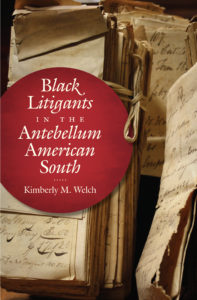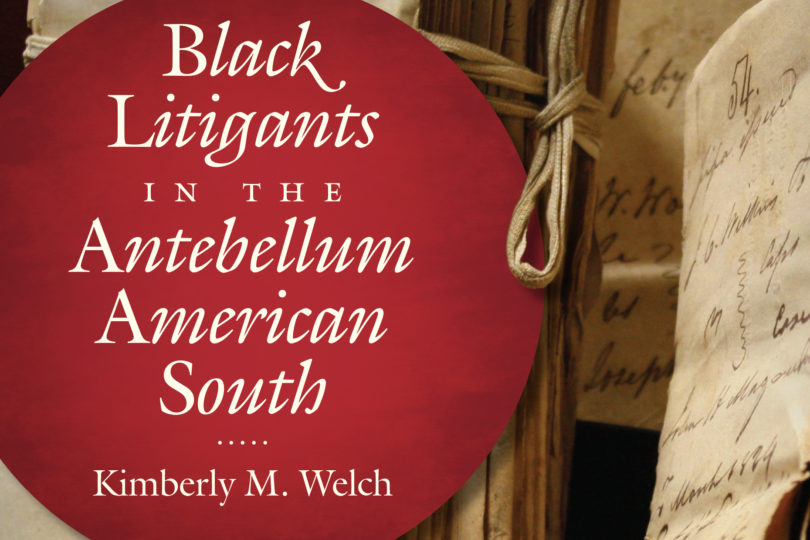The Docket: Professor Kimberly Welch, thanks for taking time to discuss your remarkable article in the latest issue of Law and History Review, William Johnson’s Hypothesis: A Free Black Man and the Problem of Legal Knowledge in the Antebellum United States South.” Perhaps it’s best to begin with your source material: the diaries of William T. Johnson of Natchez, Mississippi. Who was he?
Kimberly Welch: William Johnson was a free black barber and businessman. Born in 1809, Johnson was the son of his white master, also named William Johnson, and Amy Johnson, his owner’s slave. The elder William Johnson, a planter in Adams County, manumitted Amy in 1814 and their daughter, Adelia, in 1818. In 1820, he petitioned the Mississippi legislature for a special act allowing him to manumit young William. In his petition, Johnson requested that the state legislature “permit him to make that disposition of his property most agreeable to his feelings & consonant with humanity – the act to give that Liberty to a human being which all are entitled to as a Birthright, & extend the hand of humanity to a rational creature, on whom unfortunately Complexion, Custom, & even Law in this Land of Freedom, has conspired to rivet the fetters of Slavery.” The Mississippi Legislature approved the bill of manumission on February 10, 1820, and Governor George Poindexter signed it on the same day.[1] What role the elder William Johnson played in his family’s life after manumitting them, if any, is unclear. He never recognized Adelia and William as his natural children, for instance, as some slaveholders in the region did. But they (and their mother) continued to use his name. After his manumission, young William apprenticed as a barber in his brother-in-law’s busy shop and soon became Natchez’s leading barber and a respected and prosperous businessman. When he died in 1851, he held a significant amount of property.
Johnson’s diary spans at least fifteen years (1836-1851), and it is several hundred pages long. With the exception of a few days here and there, he made daily entries—some short, some long. The entries, however, are often cryptic (with little embellishment or explanation) and frequently mundane. Uncovering meaning and pulling together a story required drawing on the skills of a social historian. Working with it, I was reminded of Laurel Thatcher Ulrich’s wonderful excavation of Martha Ballard’s diary (one similar in style to Johnson’s) and the counting, mapping, and piecing together she did to make sense of Ballard’s story. Doing so took her eight years.
In his personal and business dealings, Johnson navigated complex racial and economic relationships on a daily basis. You argue that Johnson’s everyday life helped him to generate legal hypotheses—strategies for using the law based on “assumptions, performances, and hunches.” Can you elaborate on this view of legal action and how it helps explain the relationship of black Natchez residents to the law?
My view of legal knowledge as “hunches” or “hypotheses” developed as I read the diary. Working with a diary was advantageous because it provided a window into Johnson’s personal experiences with law and how those experiences shaped his conceptions of law over the course of his lifetime (experiences that, as a reader, I was able to follow diachronically). Such a view isn’t really possible when working with sources such as court records, because they only provide a glimpse into someone’s interactions with the legal system—a glimpse into a particular moment—and are mediated by lawyers, clerks, and other legal officials. Johnson’s diary brings into focus a complex set of ideas about a world of law—and an expanding sense of what law does for a person—acquired over time through personal experience. I think this way of understanding legal knowledge is applicable to any ordinary person approaching the legal system—black or white.
One striking thing about your article is the degree of drama you build. Granted, the historical actors (Johnson and his antagonist Baylor Winn) provided a compelling plot, but you render the facts as an actual page-turner. Did you know the end of Johnson’s story before your research began, and did the story shape your analytical approach?
I was aware of the circumstances of Johnson’s death before I began this article; a number of scholars have discussed it, albeit not in great depth, and Johnson played a bit part in my first book (namely as a property-holder and less as a legal actor). However, the events that led to his death and what came later did not shape my analytical approach—at least at first. In fact, I had intended to write an article about Johnson as a moneylender (something I have recently turned my attention to). It was only after reading the diary from beginning to end that I realized two things: first, Johnson’s legal battle with Winn was the product of two decades of experience with the southern legal apparatus—experience that provided him with a hypothesis about how law worked, or, perhaps more precisely, how he thought it should work. And second, Johnson did not see it coming. Certainly, Winn’s intimidations angered him, yet he did not take them seriously. Instead, he believed the problem would be sorted through legal channels, not violence. The reader can see the writing on the wall, but Johnson did not. Indeed, it is only in the last entry that Johnson admits “something is wrong.” Thus, in some ways, the drama in this article is Johnson’s (or at least my read of Johnson’s diary).
Baylor Winn escaped culpability for killing William Johnson in an unexpected way. Despite his reputation in Natchez as both a “black hearted wretch” and a black man, he produced witnesses and records to prove that he was white, which precluded the testimony of black witnesses against him. What does this courtroom bombshell tell us about the prevailing rules of race?
In part, I think this incident highlights the complications, negotiations, and tensions involved in relationships on the ground in a slave society. Interestingly, Natchez whites demonstrated significant frustration with Winn’s evasion of punishment (evidenced in the newspaper reports of the crime and subsequent trials, as well as the prosecutor’s dogged attempts to seek justice for Johnson). Yet no one suggested changing the law to allow black people to testify against whites. Doing so would open Pandora’s box. While Johnson commanded the white townspeople’s respect, their commitment to racial slavery and white supremacy far outweighed their feelings about Johnson as an individual.
Your recent book, Black Litigants in the Antebellum American South (University of North Carolina Press, 2018) explores the history of black people’s use of the law in and around Natchez. What more should our readers know about that history?

My book demonstrates that Johnson was in good company; indeed, despite their limited legal rights, free and enslaved black people made extensive use of the southern legal system. Black Litigants examines 1,000 previously unknown trial court records (stashed away in courthouse basements and storage sheds on the outskirts of southern towns) involving free black and enslaved plaintiffs and white and black defendants in civil cases in the pre-Civil War U.S. South. These records reveal a hidden world of black legal activity, one that is consequential for understanding the long history of race, rights, and civic inclusion in America. In particular, I demonstrate the ways African Americans used property rights and claims to ownership—of land, of things, of their labor, and of themselves—to assert a much broader constellation of rights and privileges. While arguably one of the most important expansions of civil rights occurred with the Fourteenth Amendment to the Constitution in 1868 (particularly the rights of former slaves to due process and equal protection under the law), black litigants in the antebellum South used their lawsuits to argue for the extension of civil rights to people of color. They did so, however, not in the language of racial equality, but in the language of property. Property served a mode of discourse—rhetoric that could be marshaled to make their claims recognizable and persuasive to others. Thus, for black Americans in the antebellum South, property rights were civil rights. In the absence of other rights, free blacks and slaves used property rights to claim and wield a host of rights linked to possession, rights that tied them to a narrative of inclusion within the polity (membership they were otherwise denied). Property relations, as I show in the book, could be envisioned as generative of an entire system of social and civic relations. Moreover, civil litigation—seemingly mundane lawsuits over property disputes, for divorce, or to recover unpaid loans—is also a significant component of the civil rights and racial justice struggle. For these lawsuits involve claims about who counts, whose voices are worth hearing, and who can and should be included.
[1] Petition of William Johnson to the Mississippi State Legislature, 1820, in Race, Slavery, and Free Blacks, Series I: Petitions to Southern Legislatures, 1777-1867, Petition Analysis Record, #11082002, Bethesda, Md.: University Publications of America, 1998. Microfilm edition.



